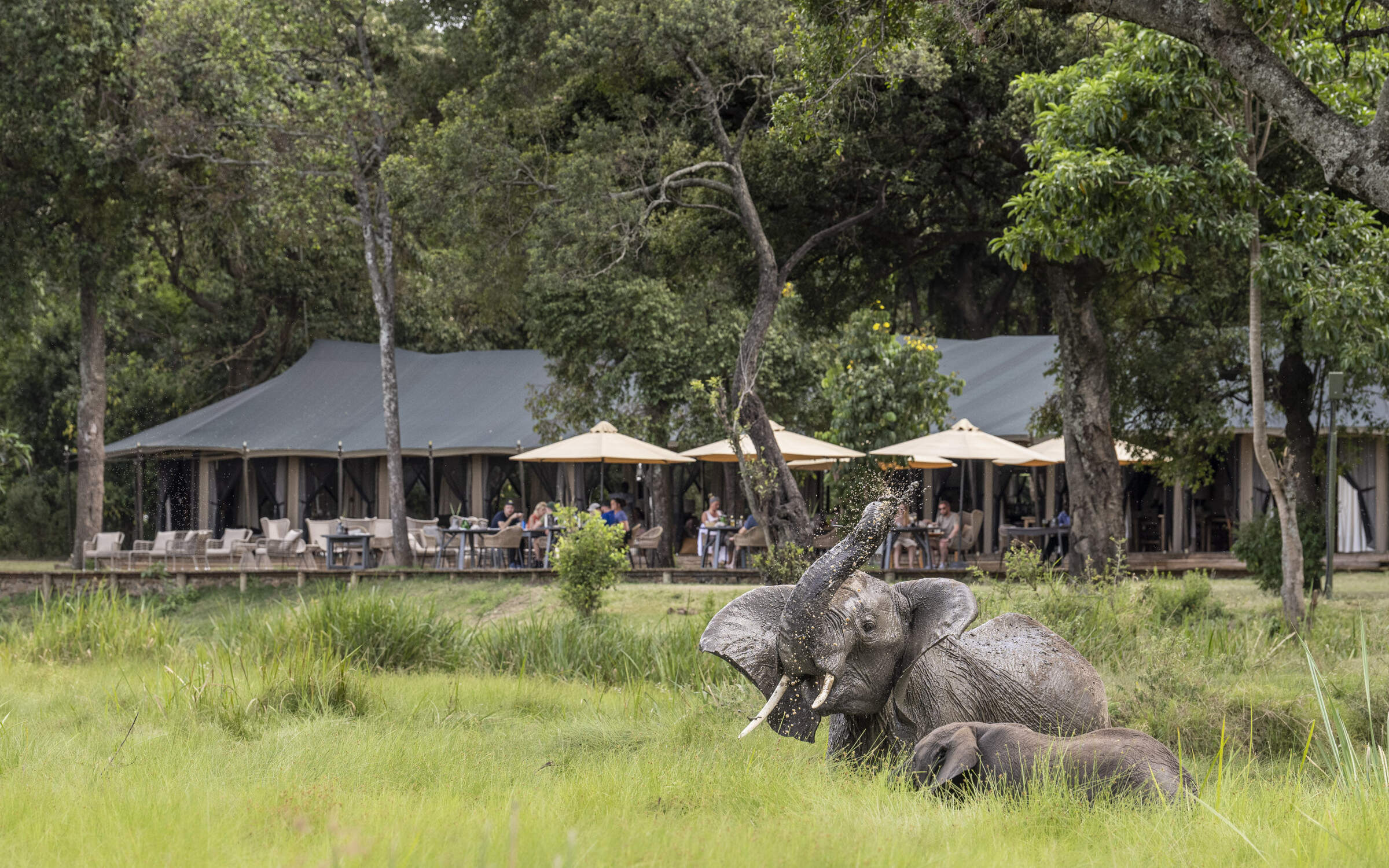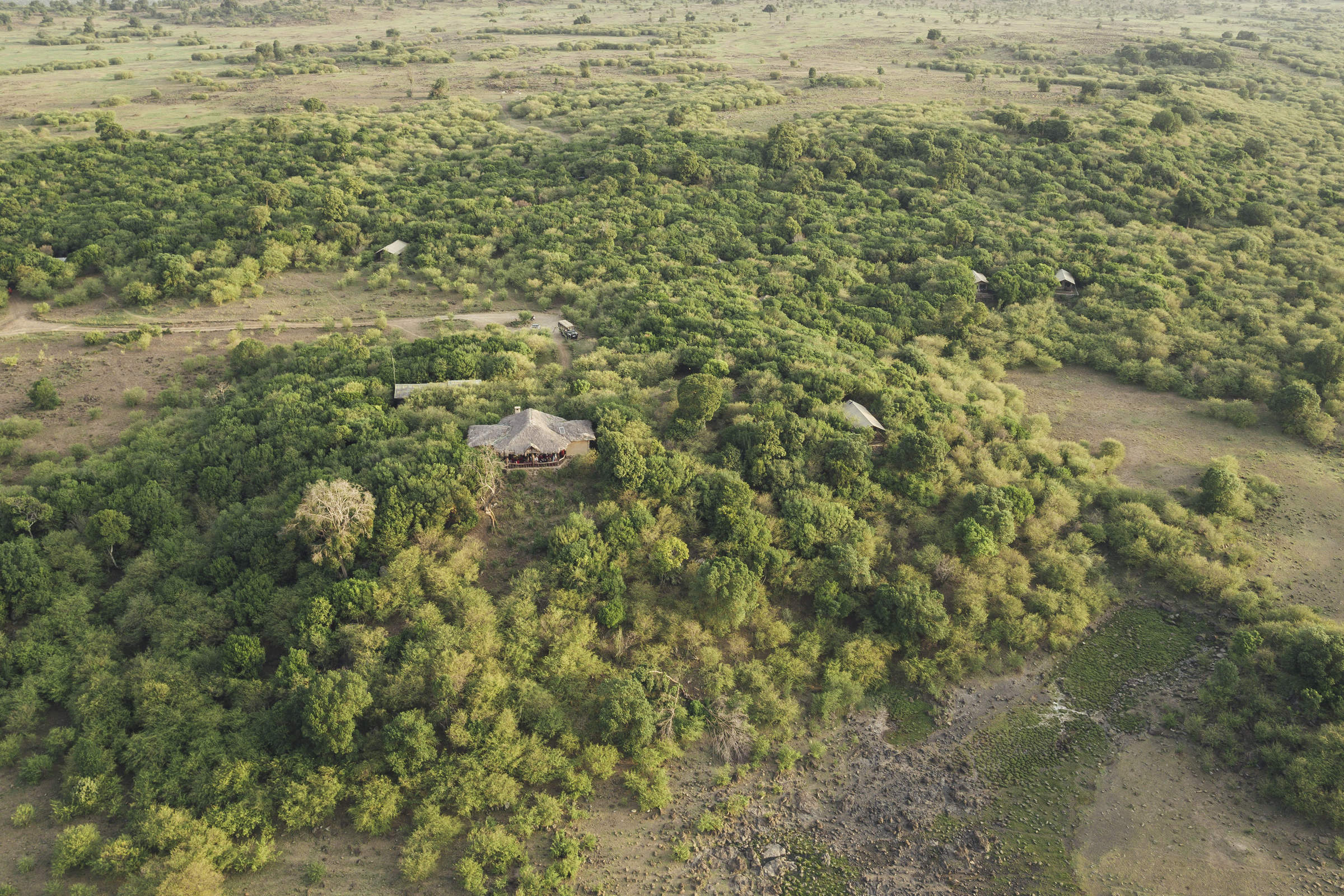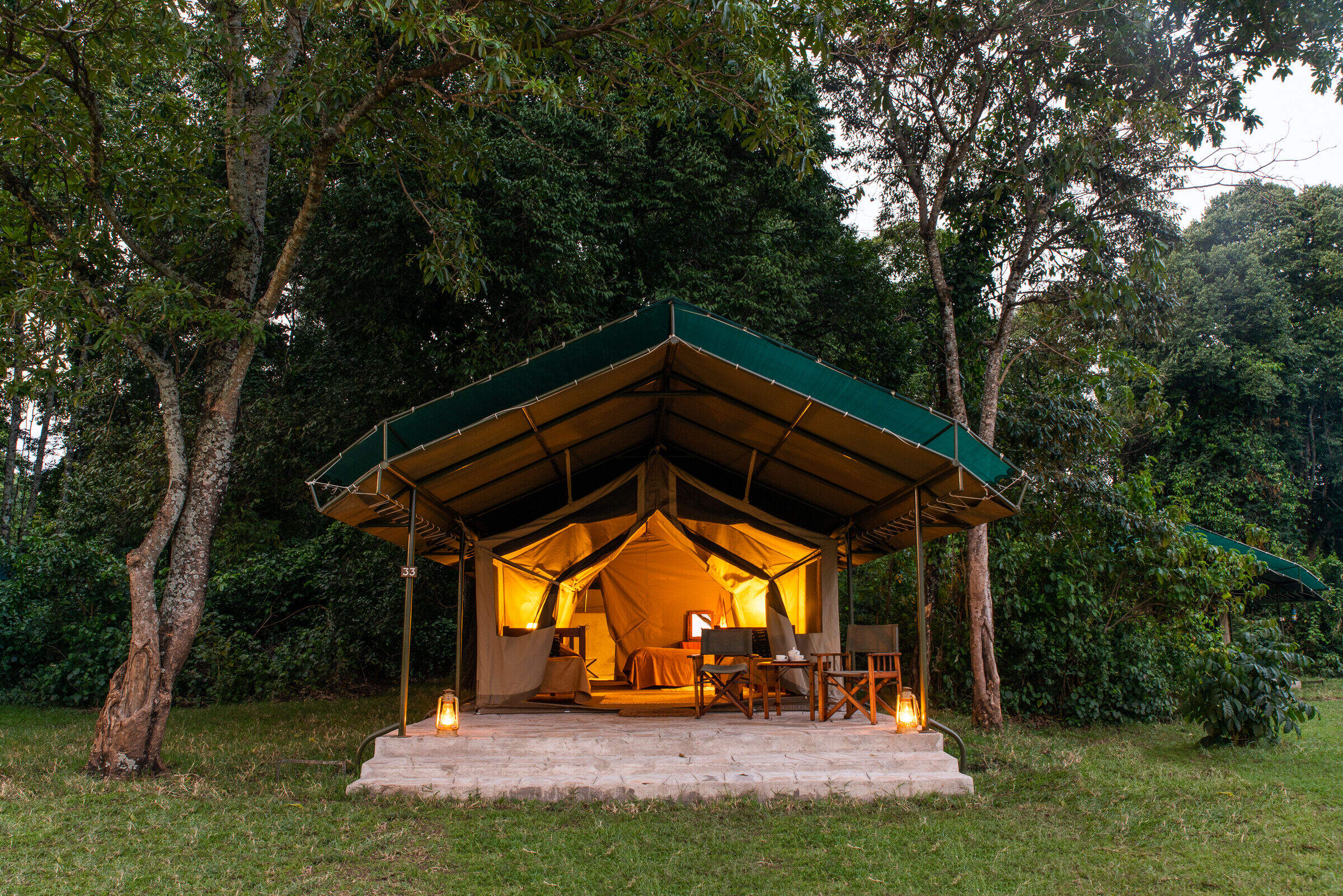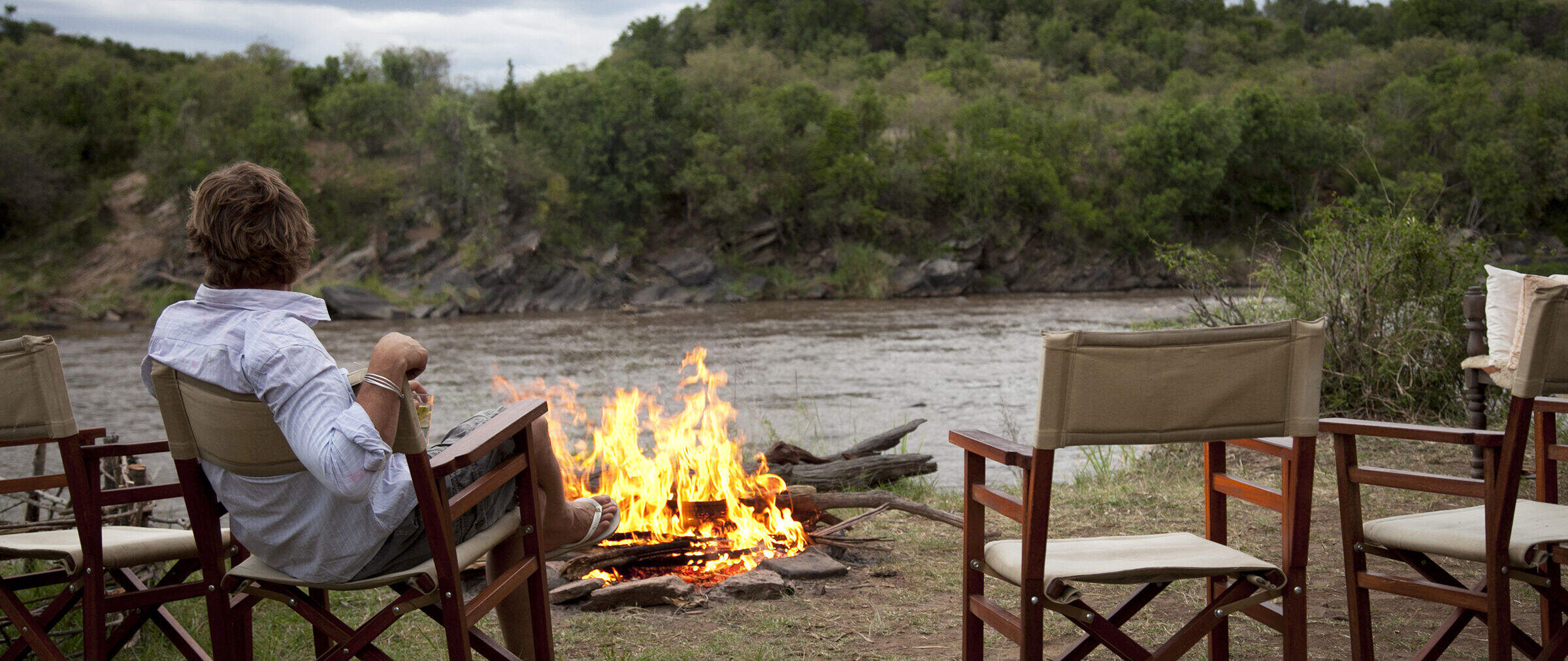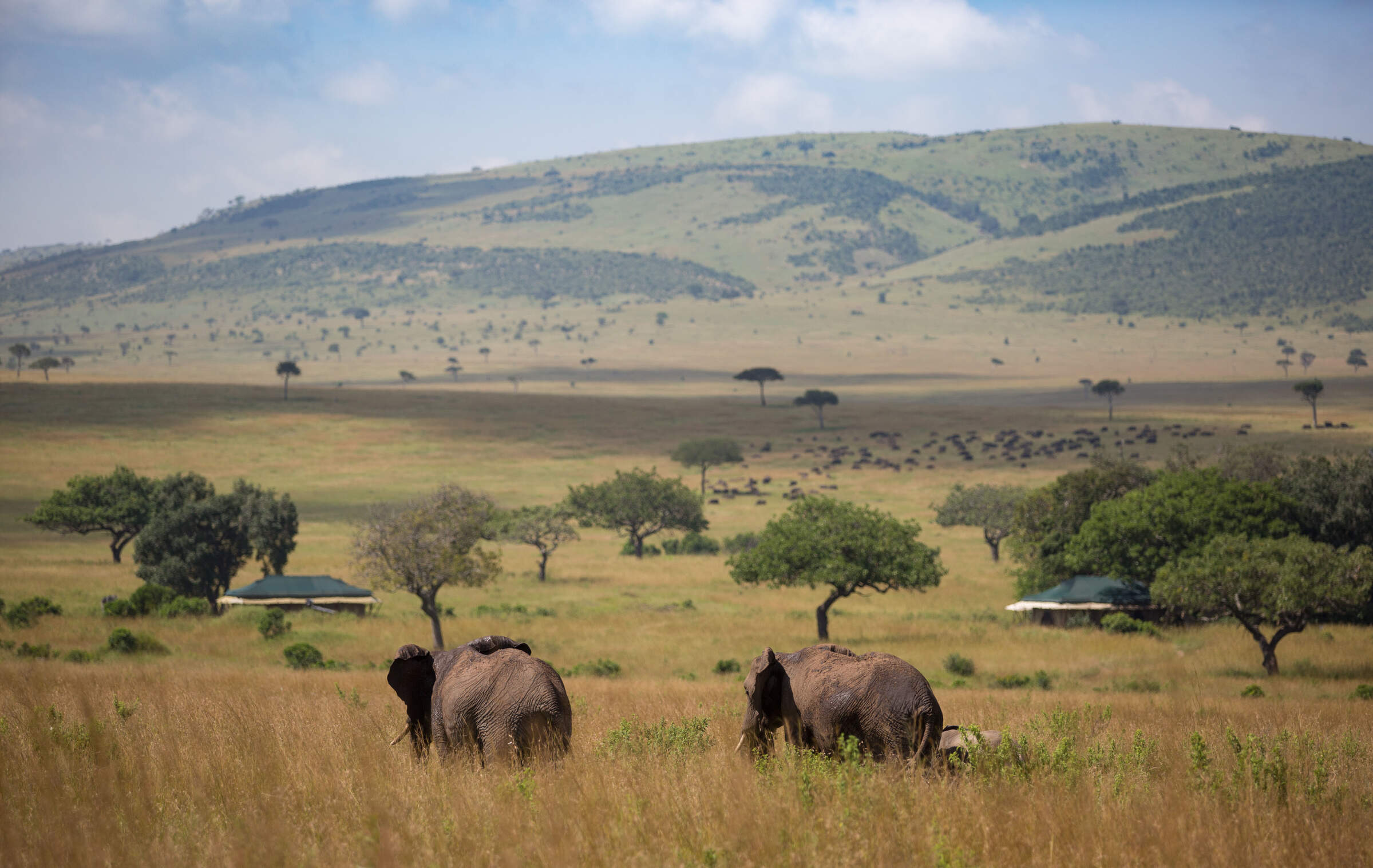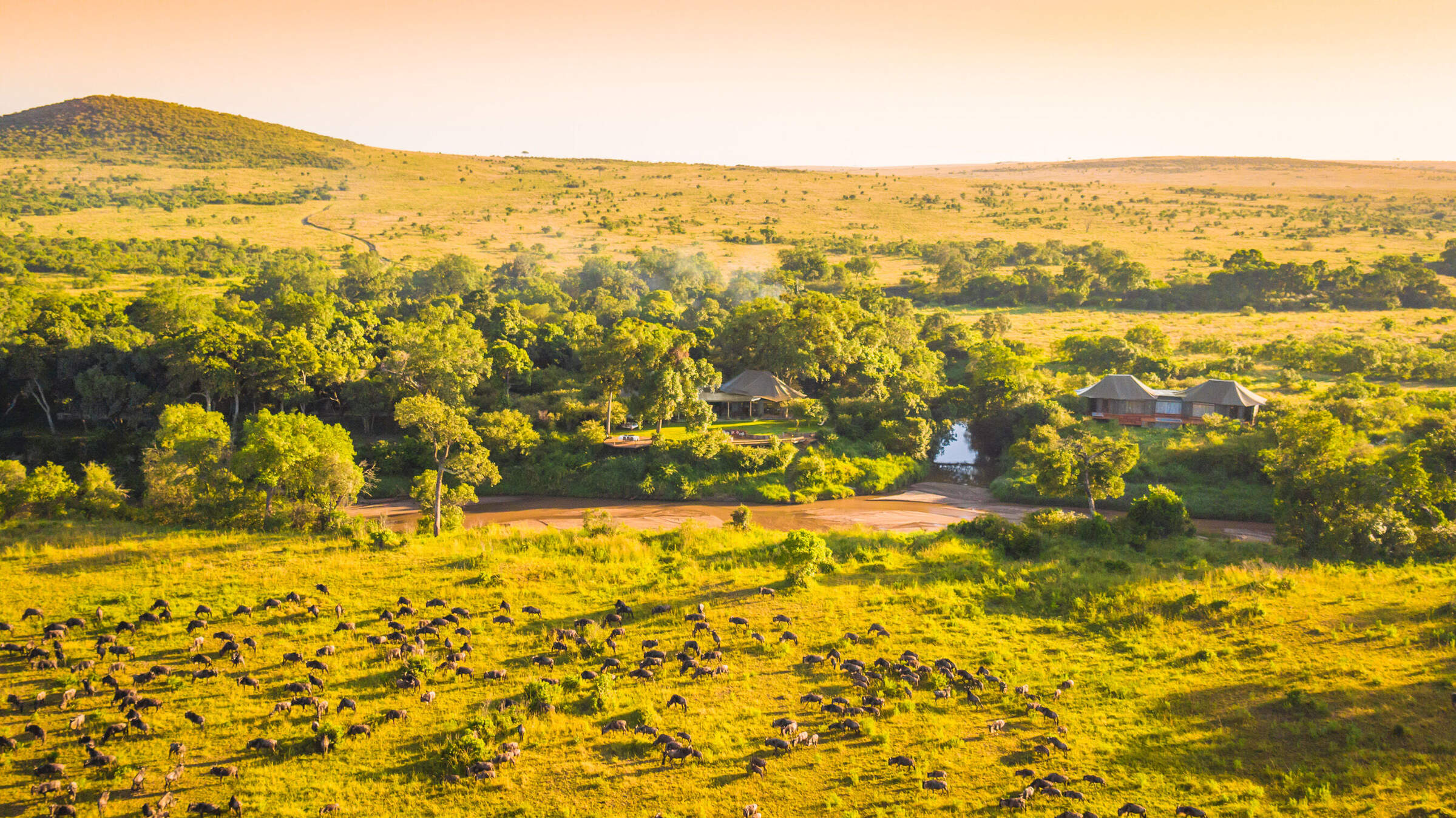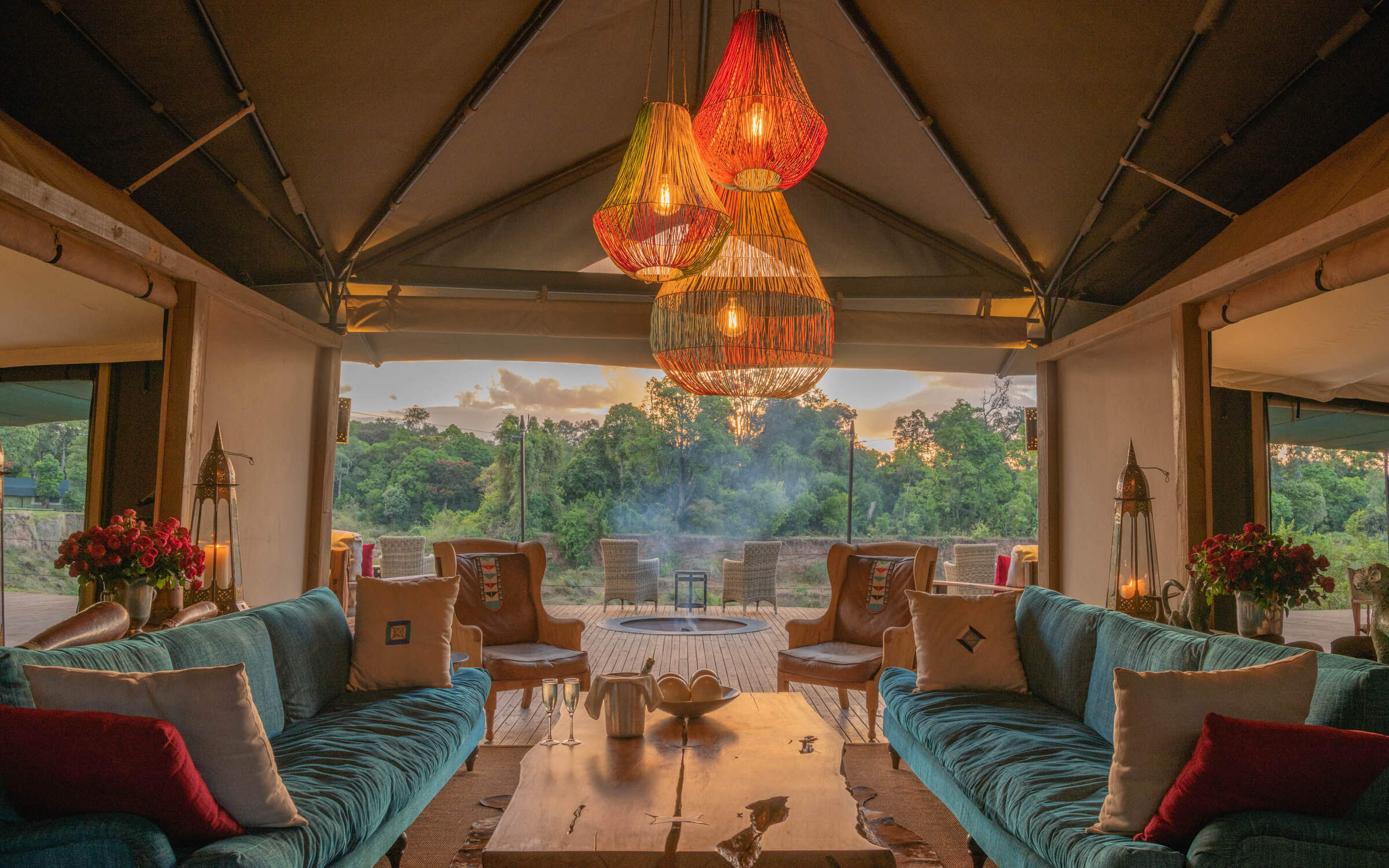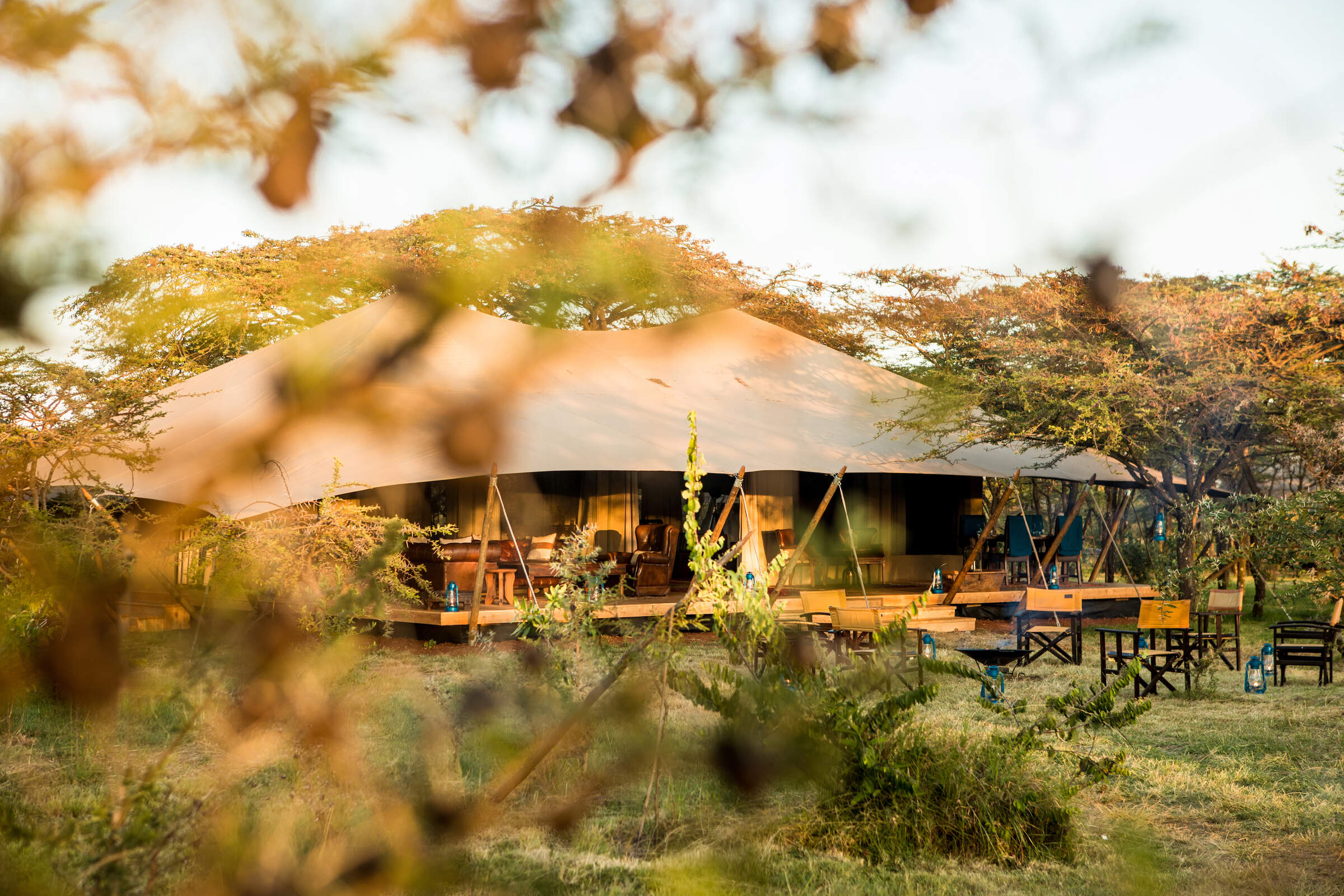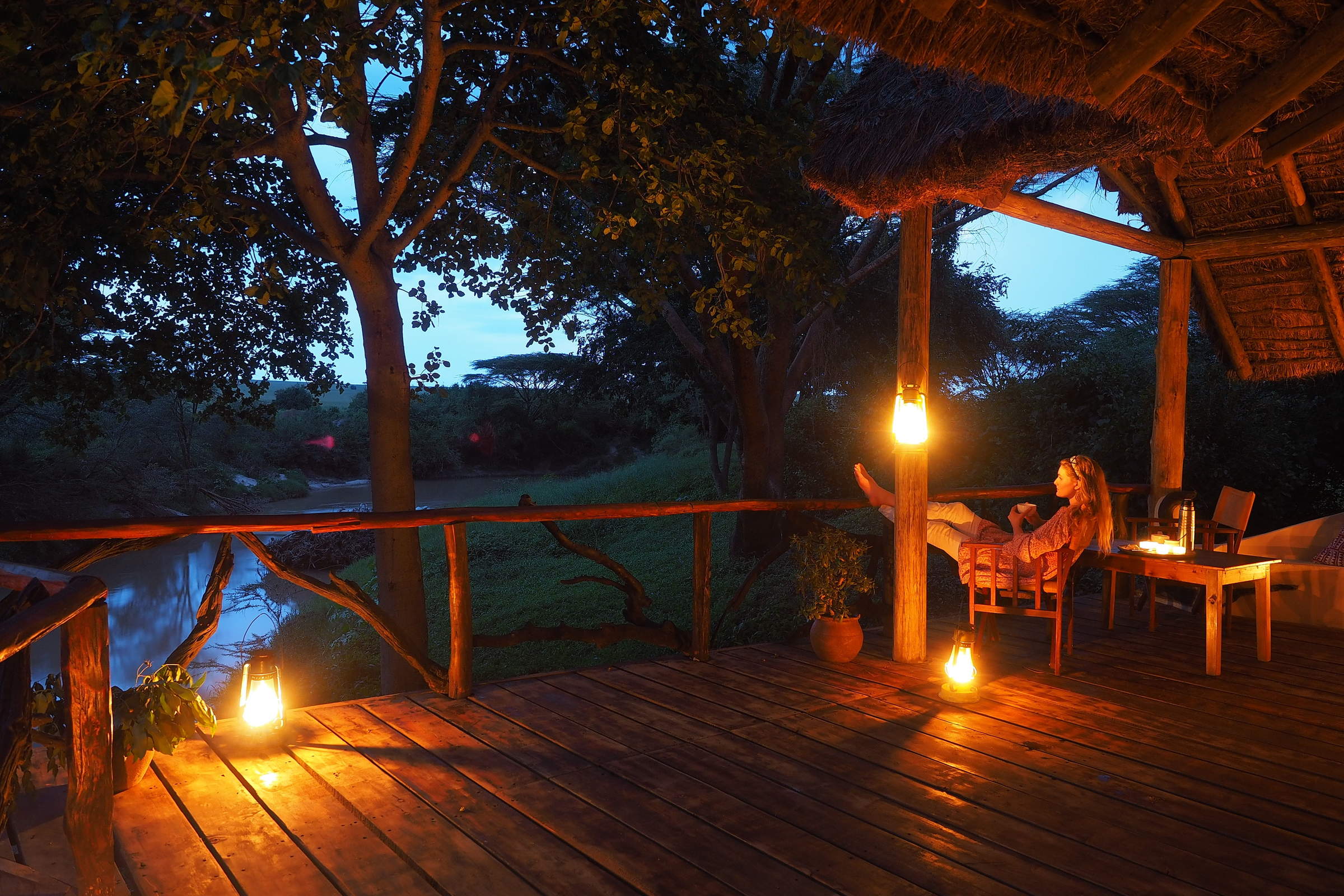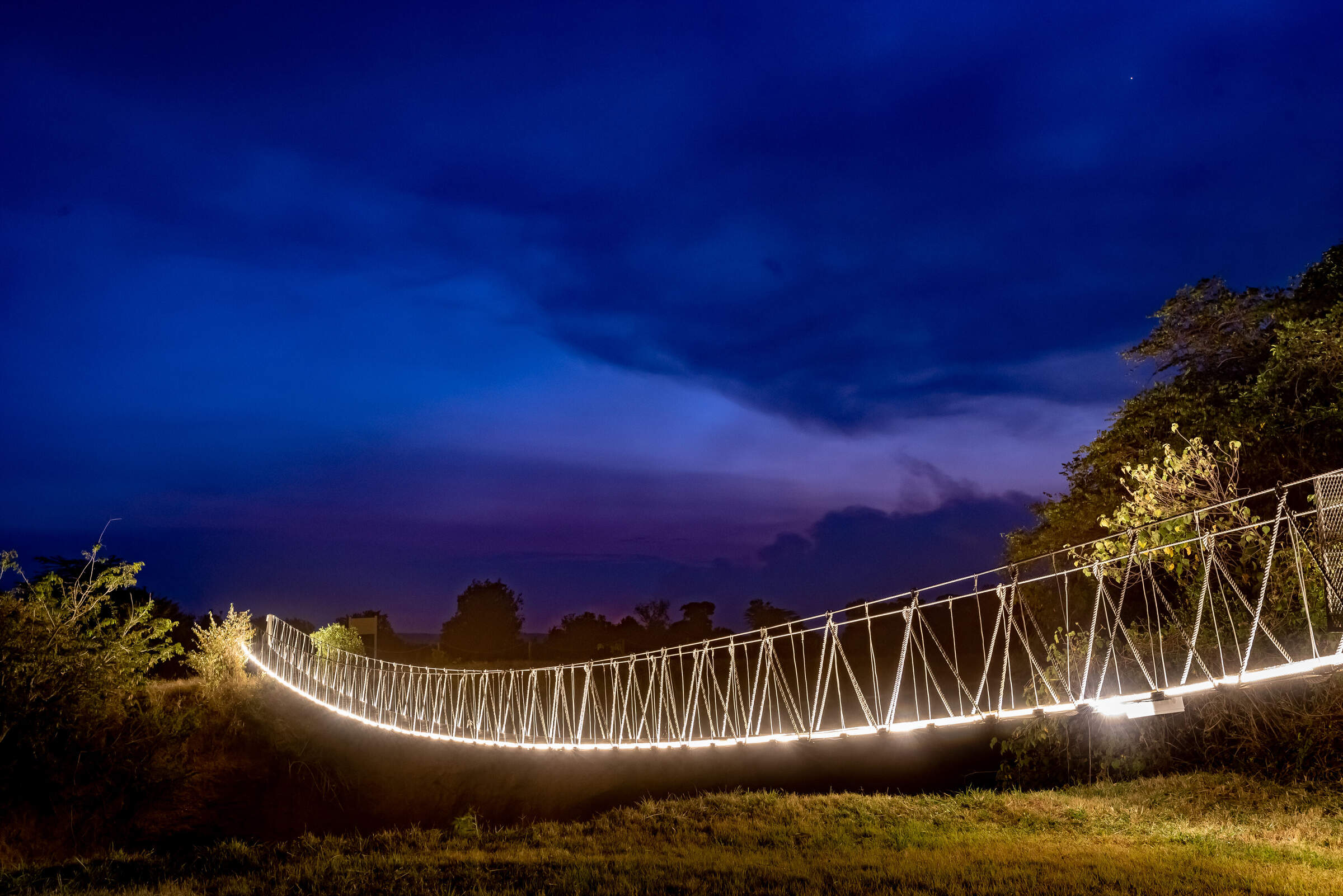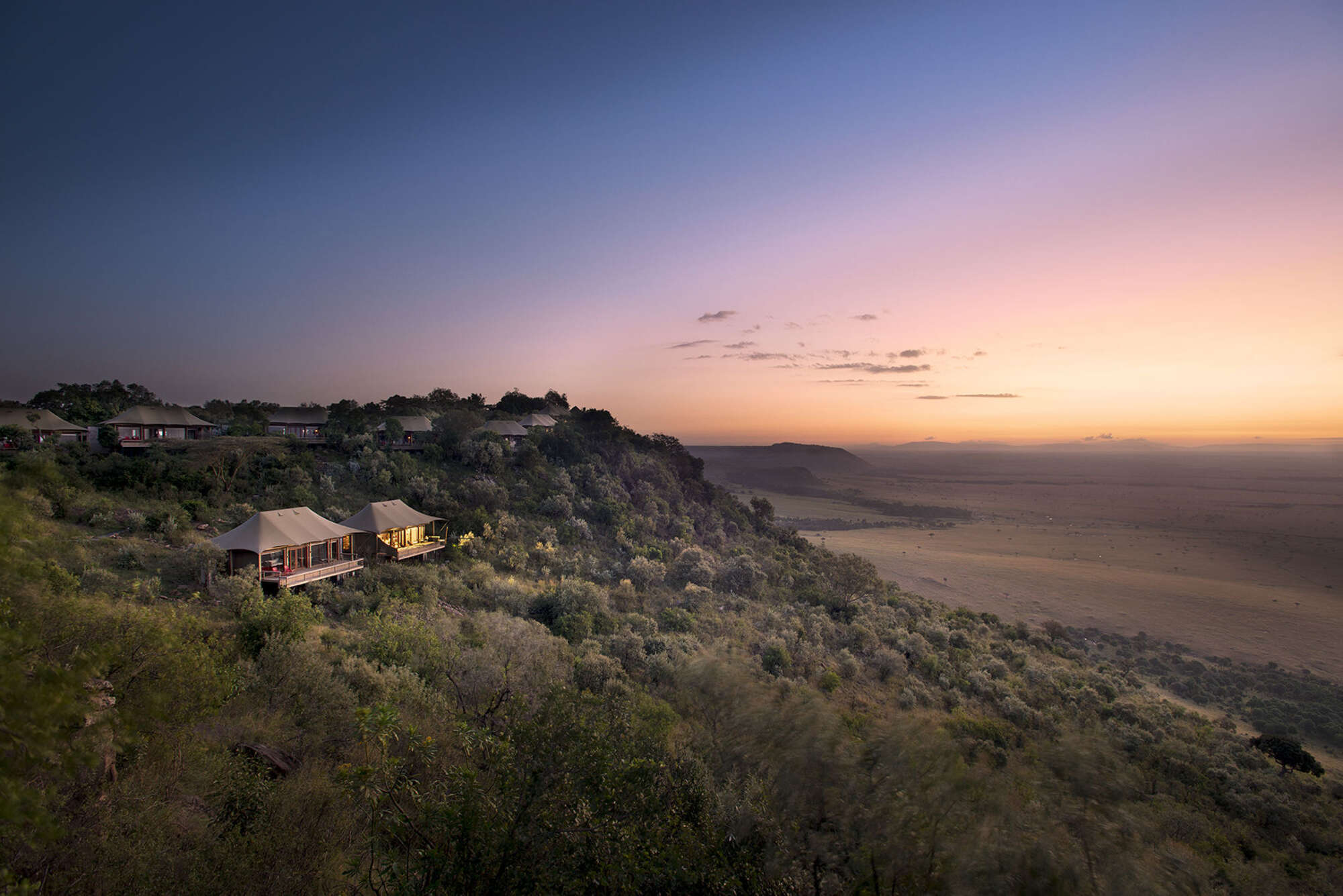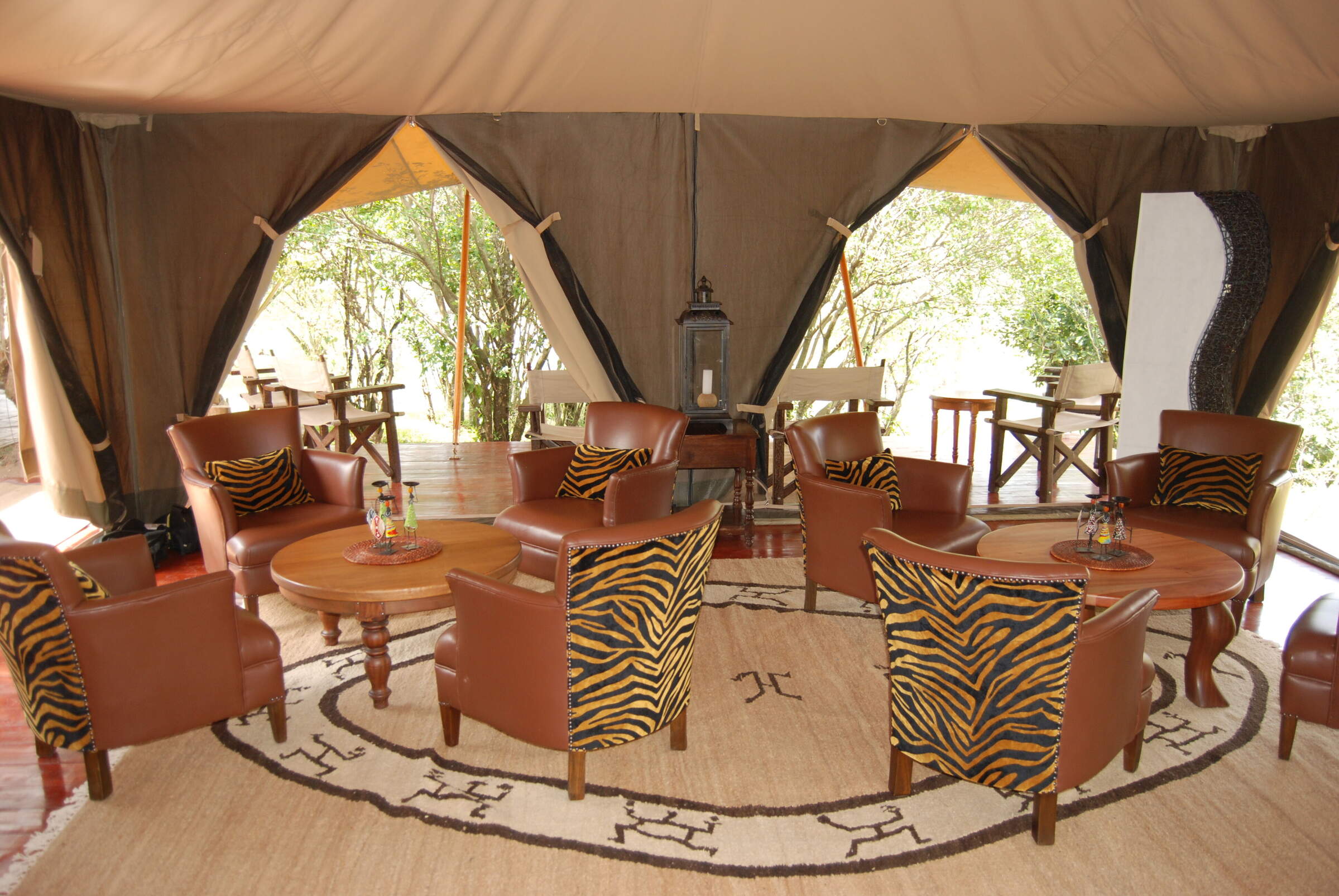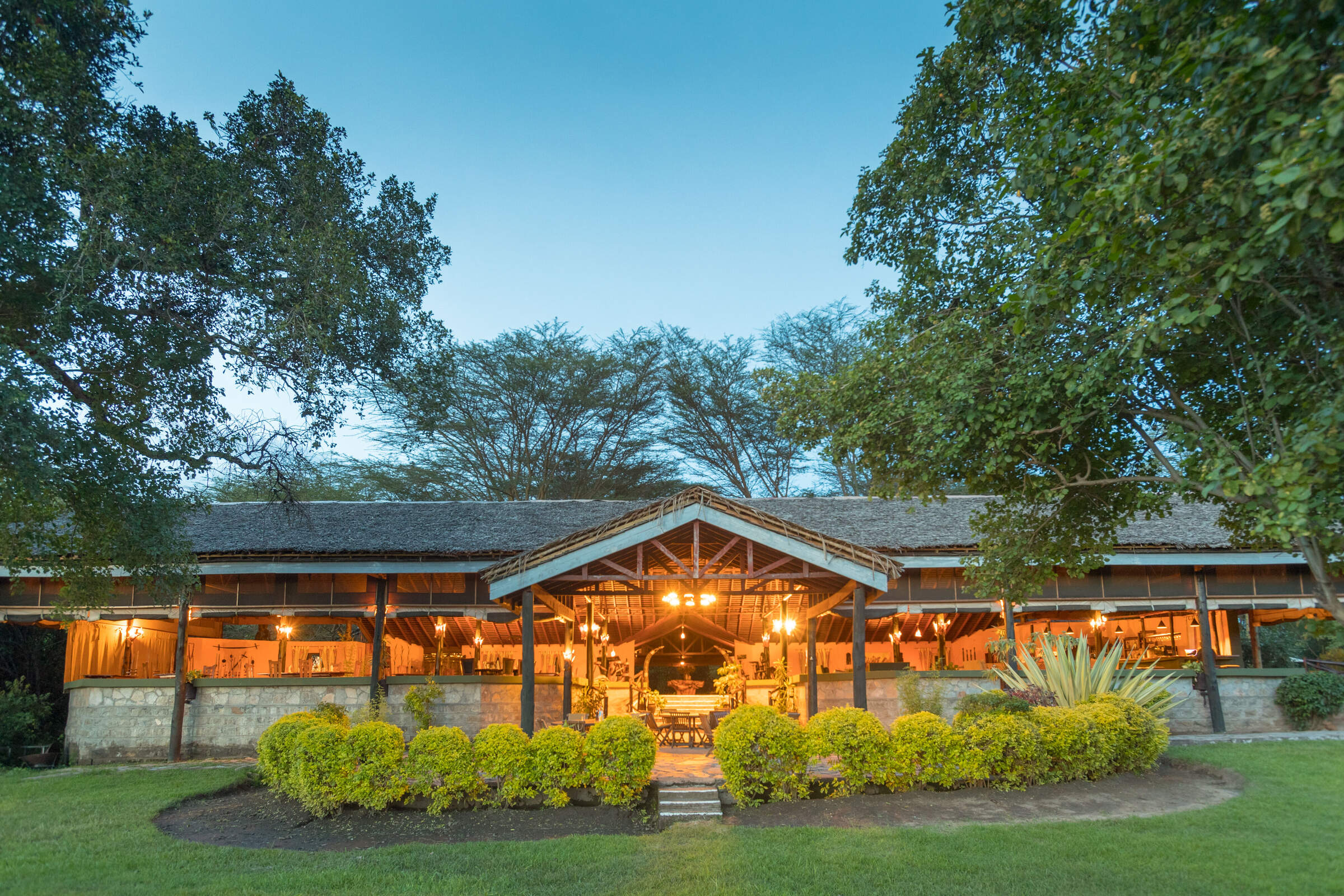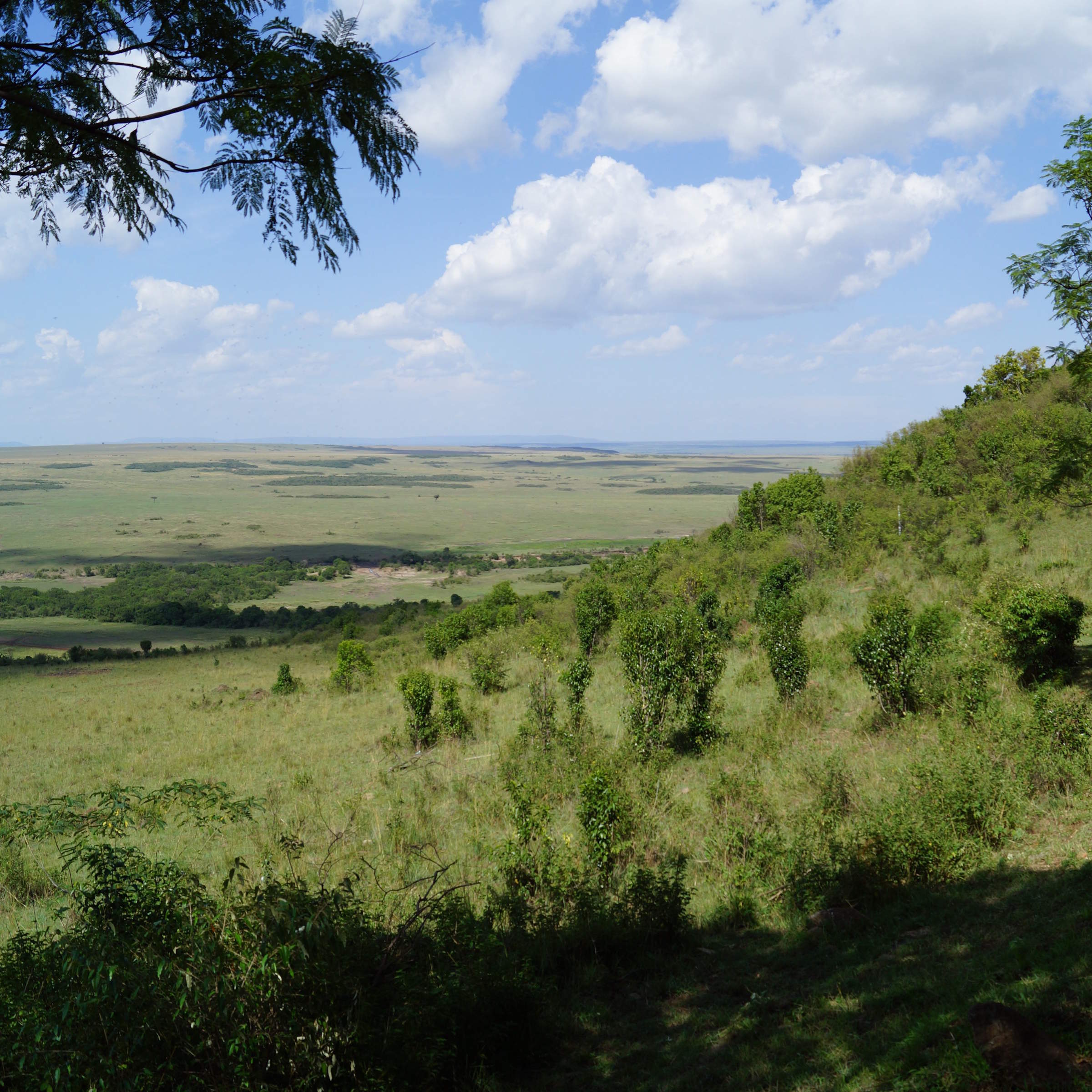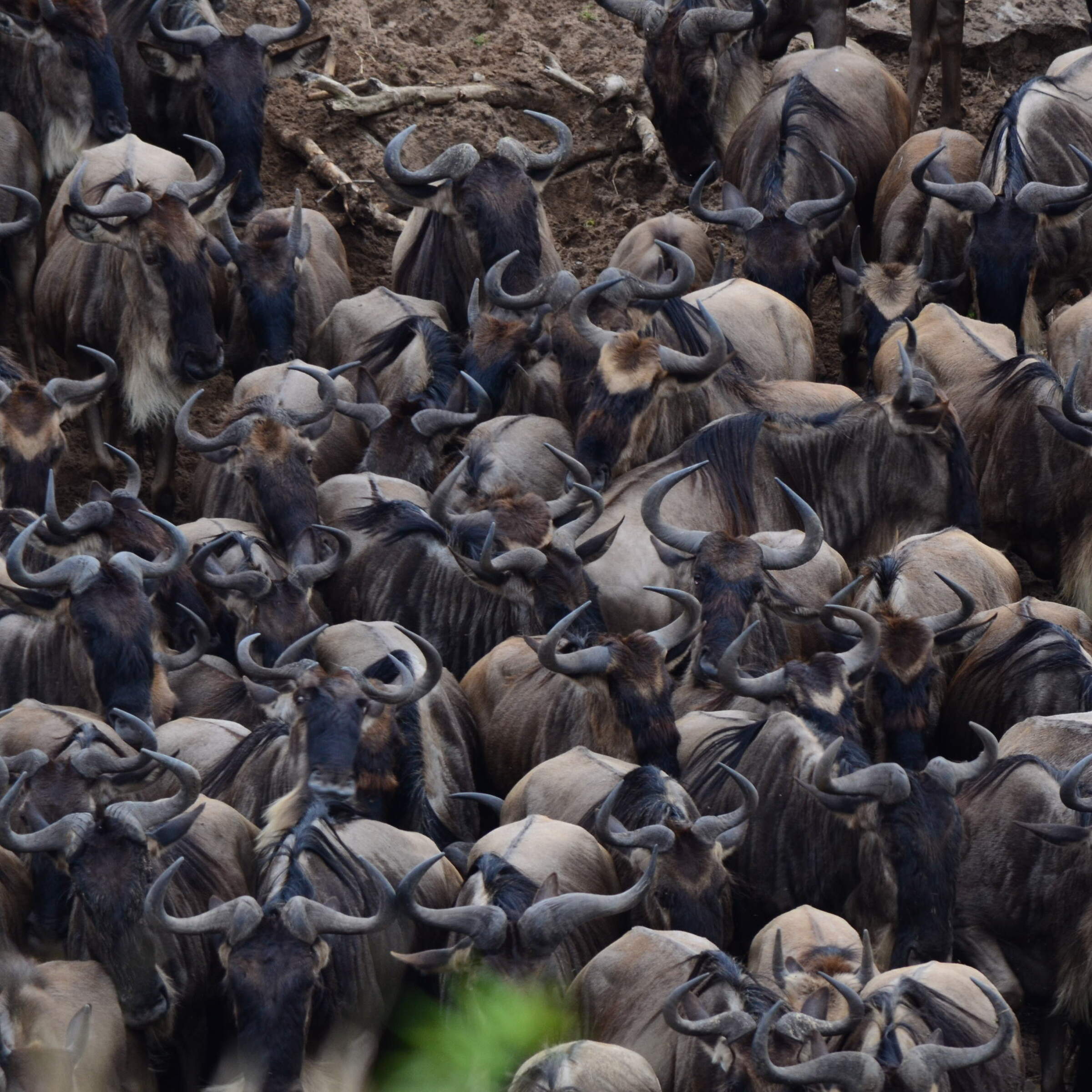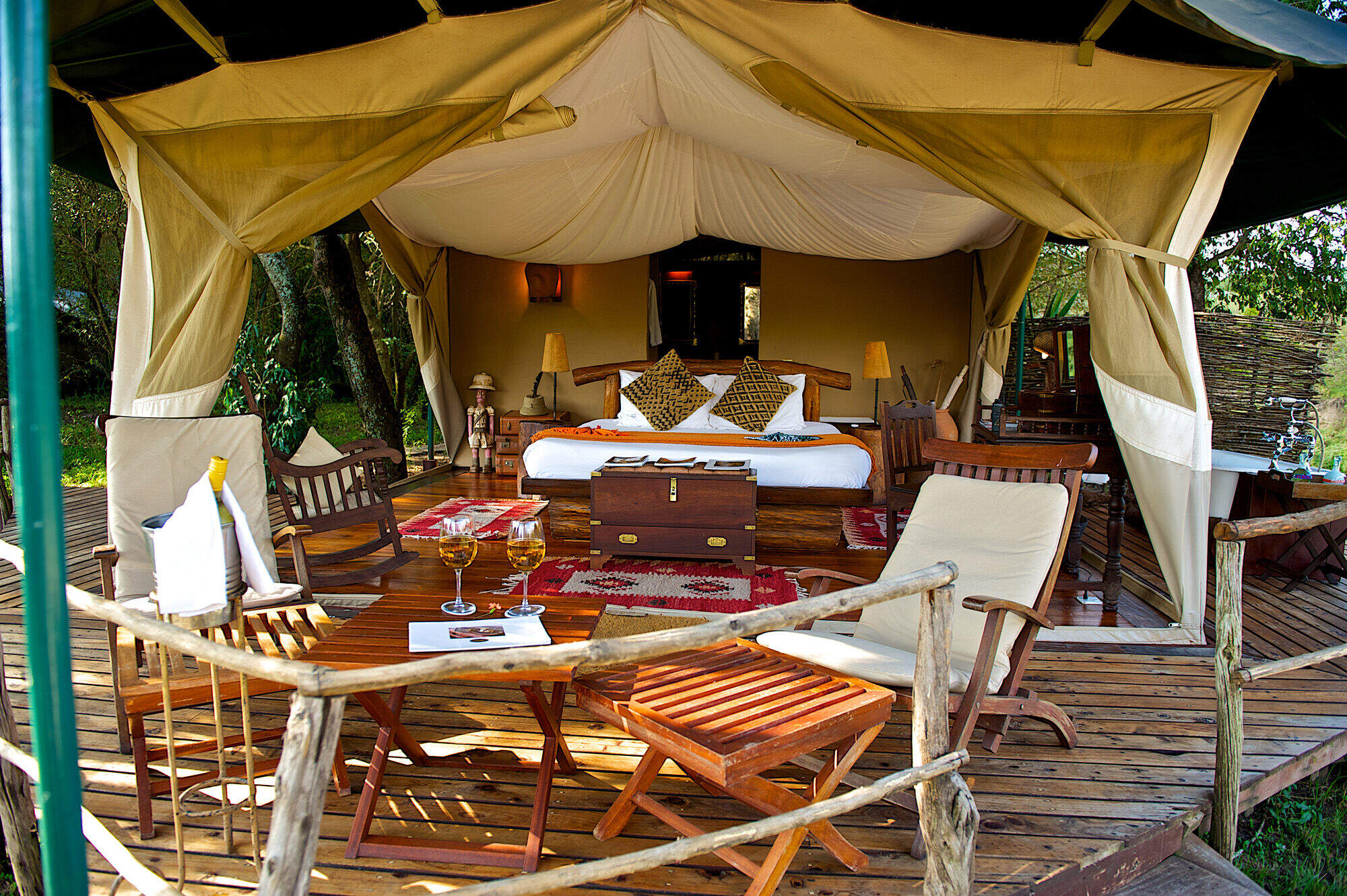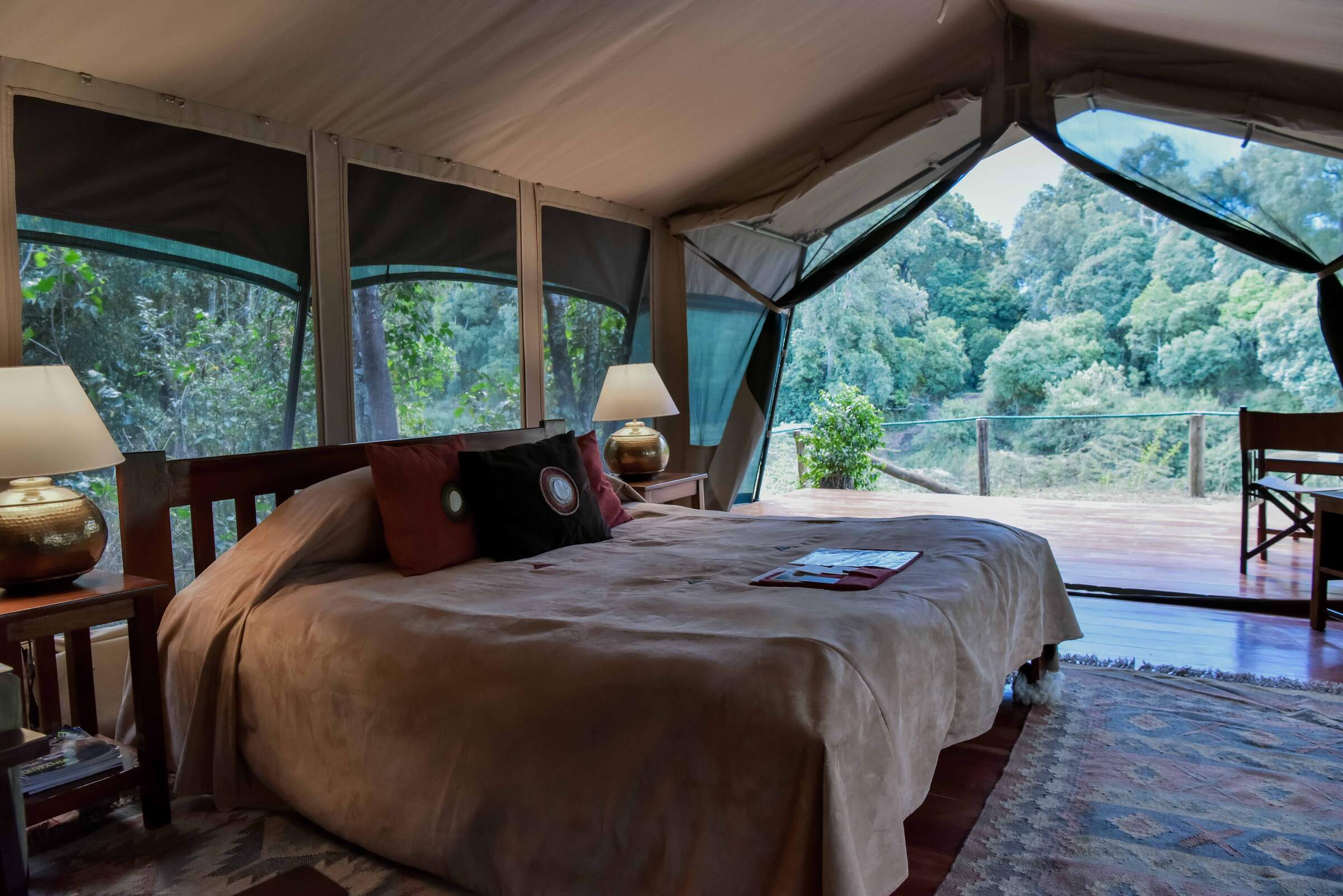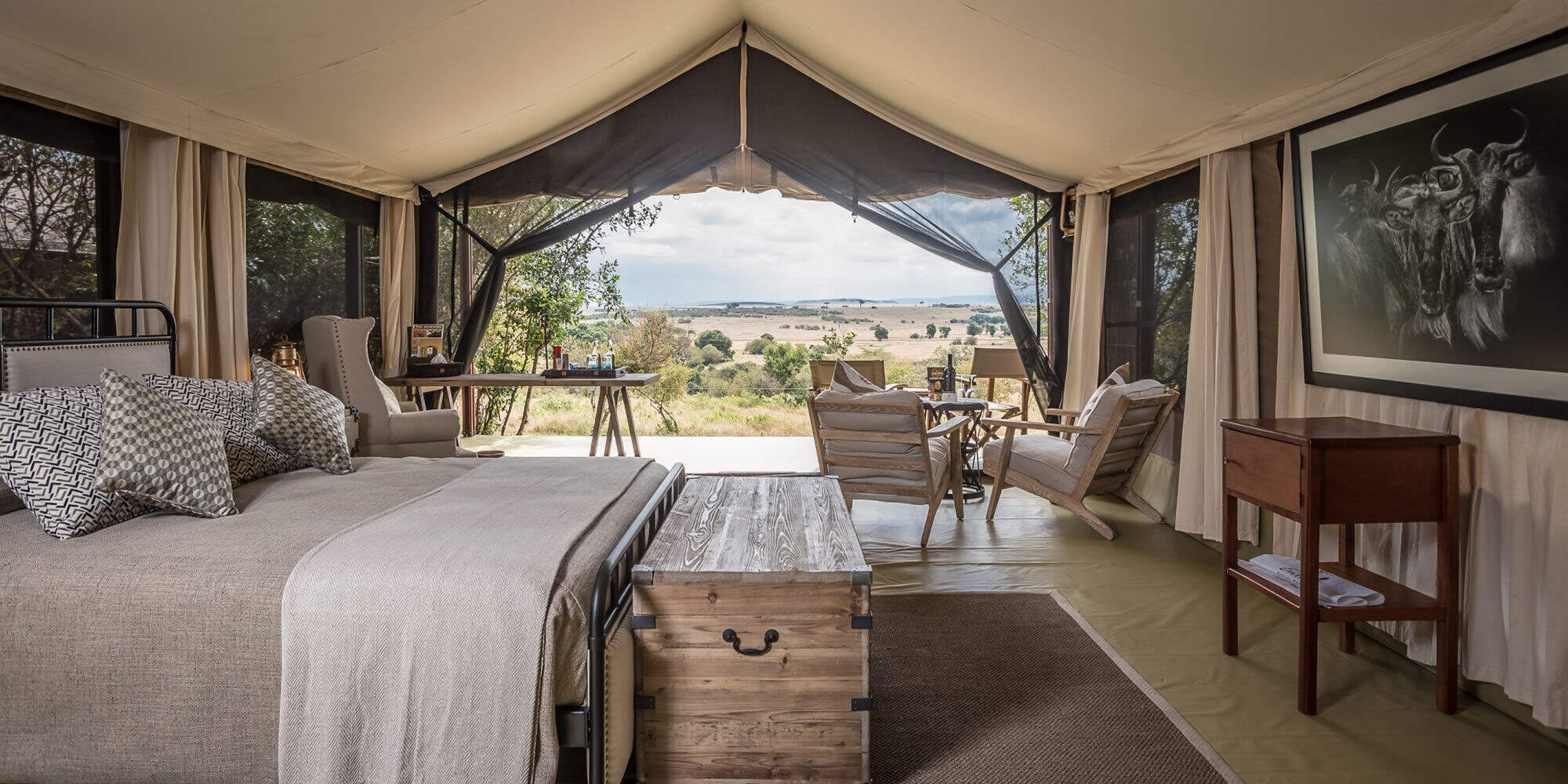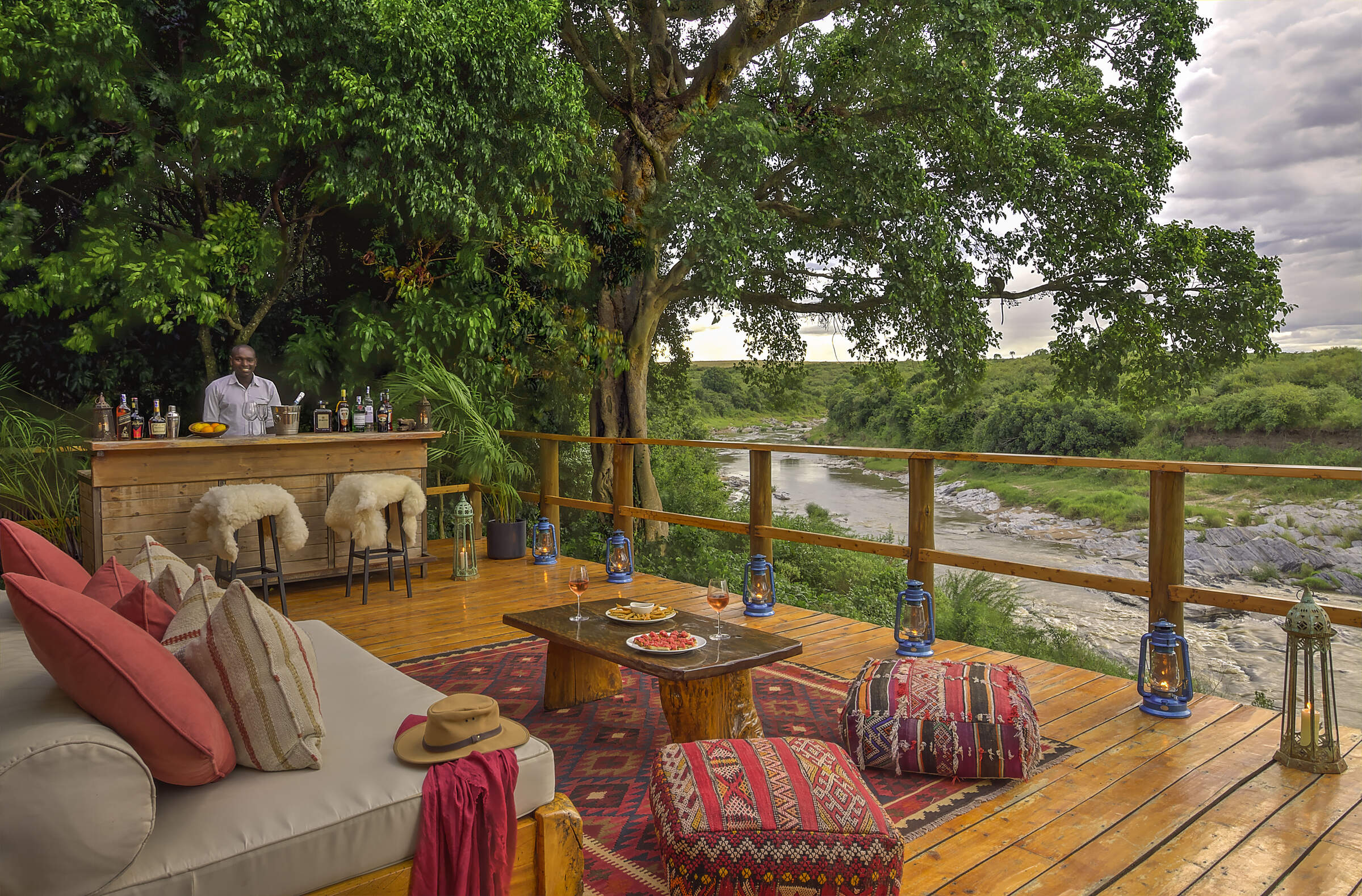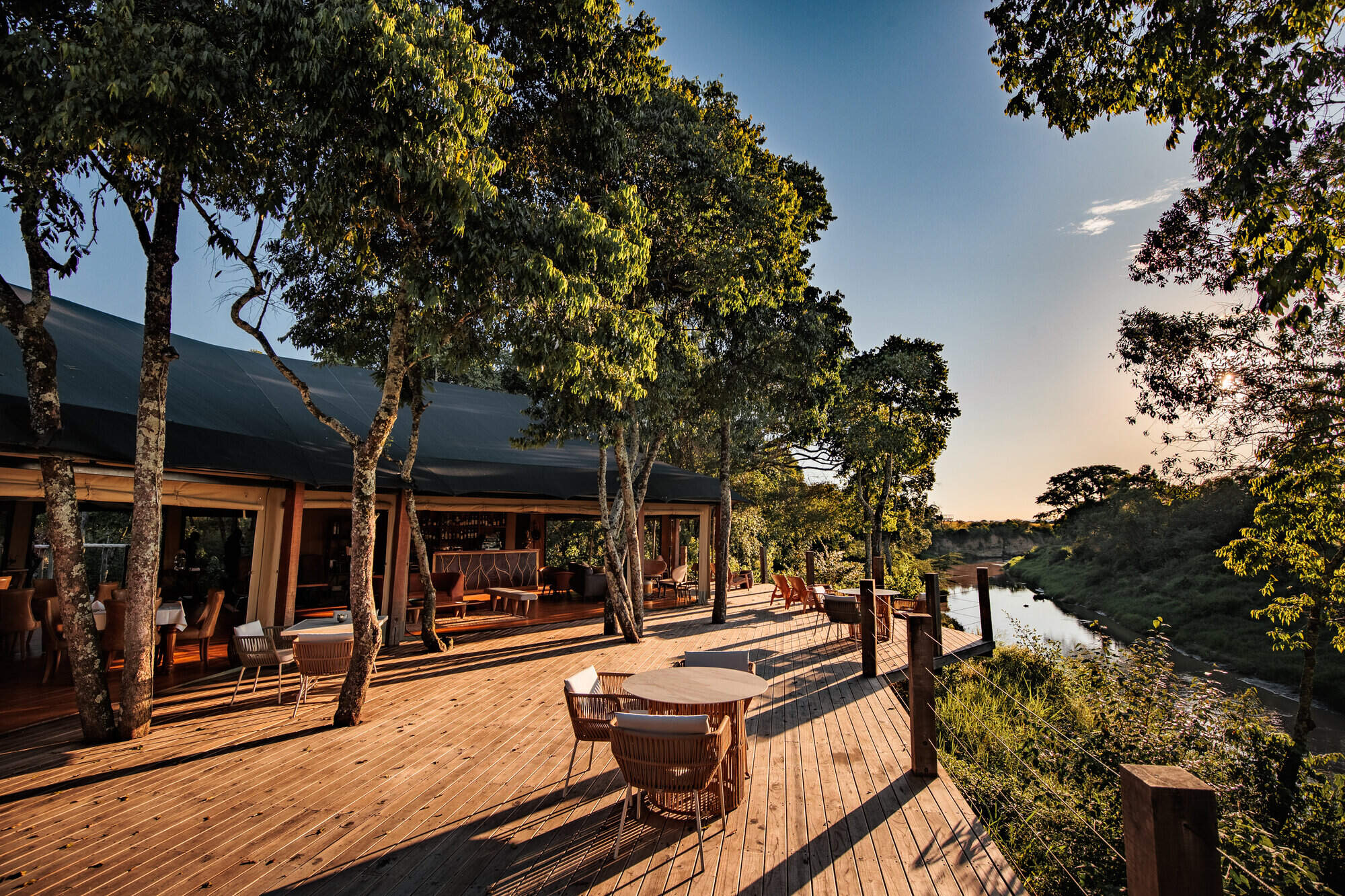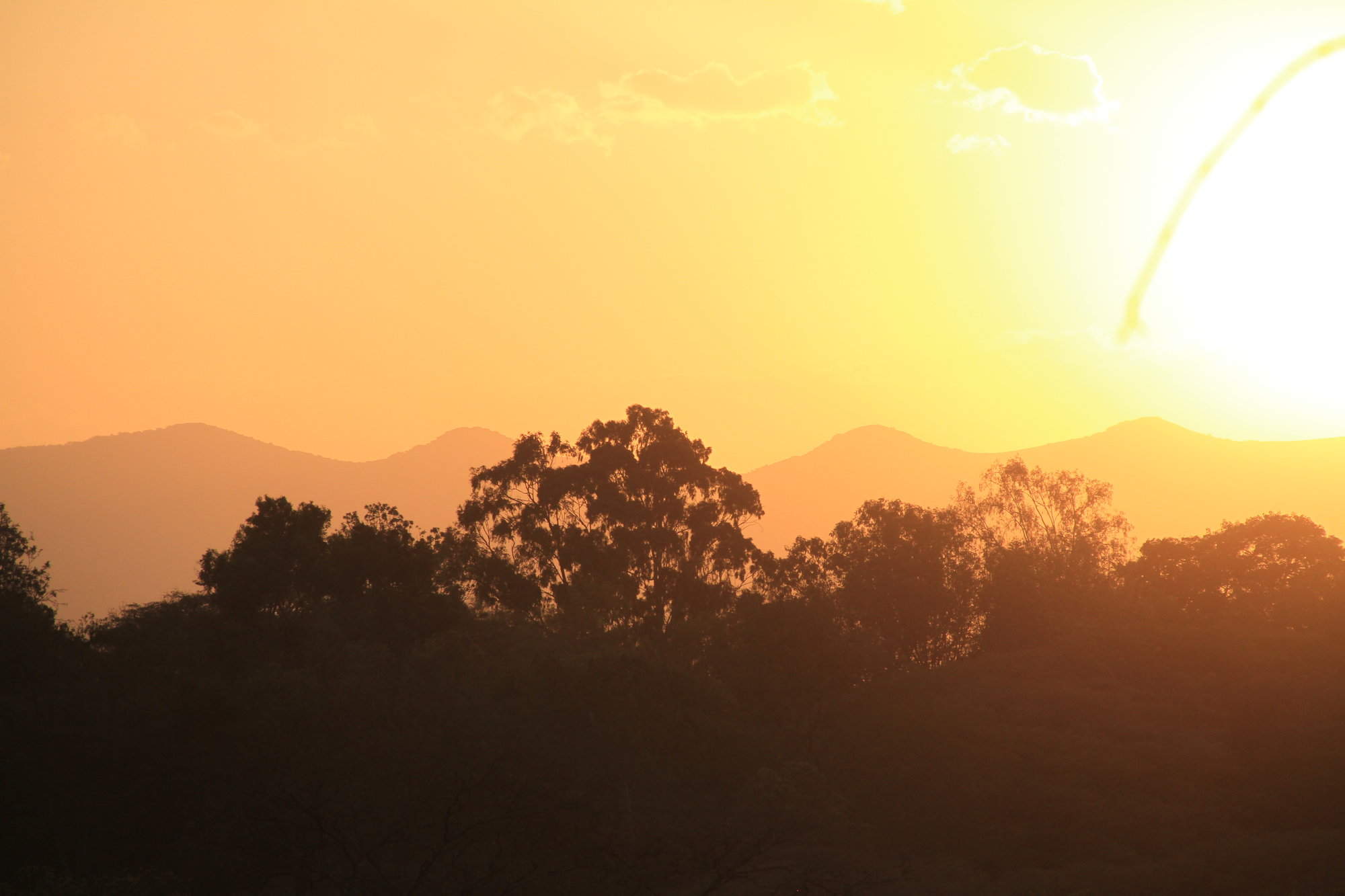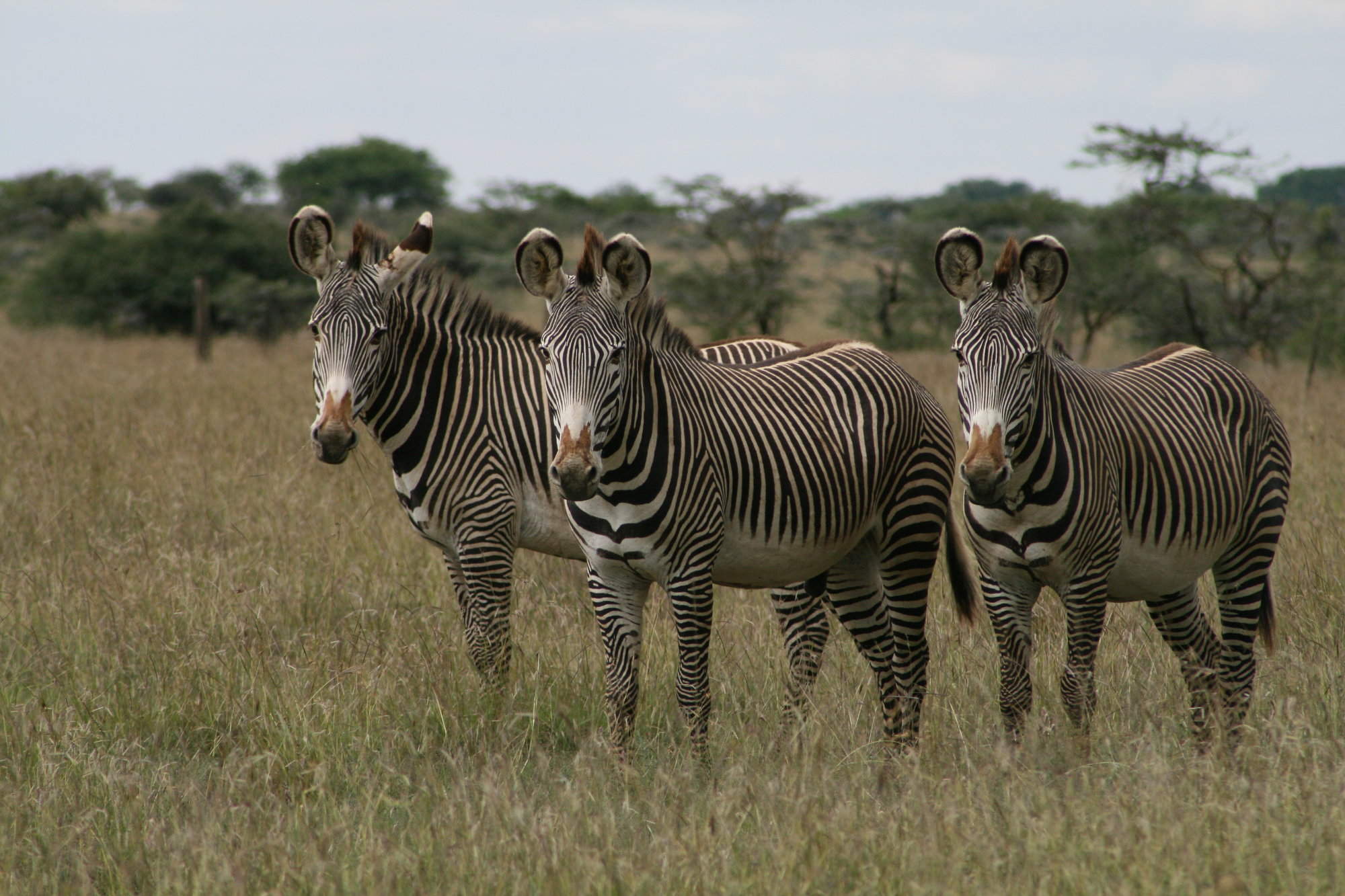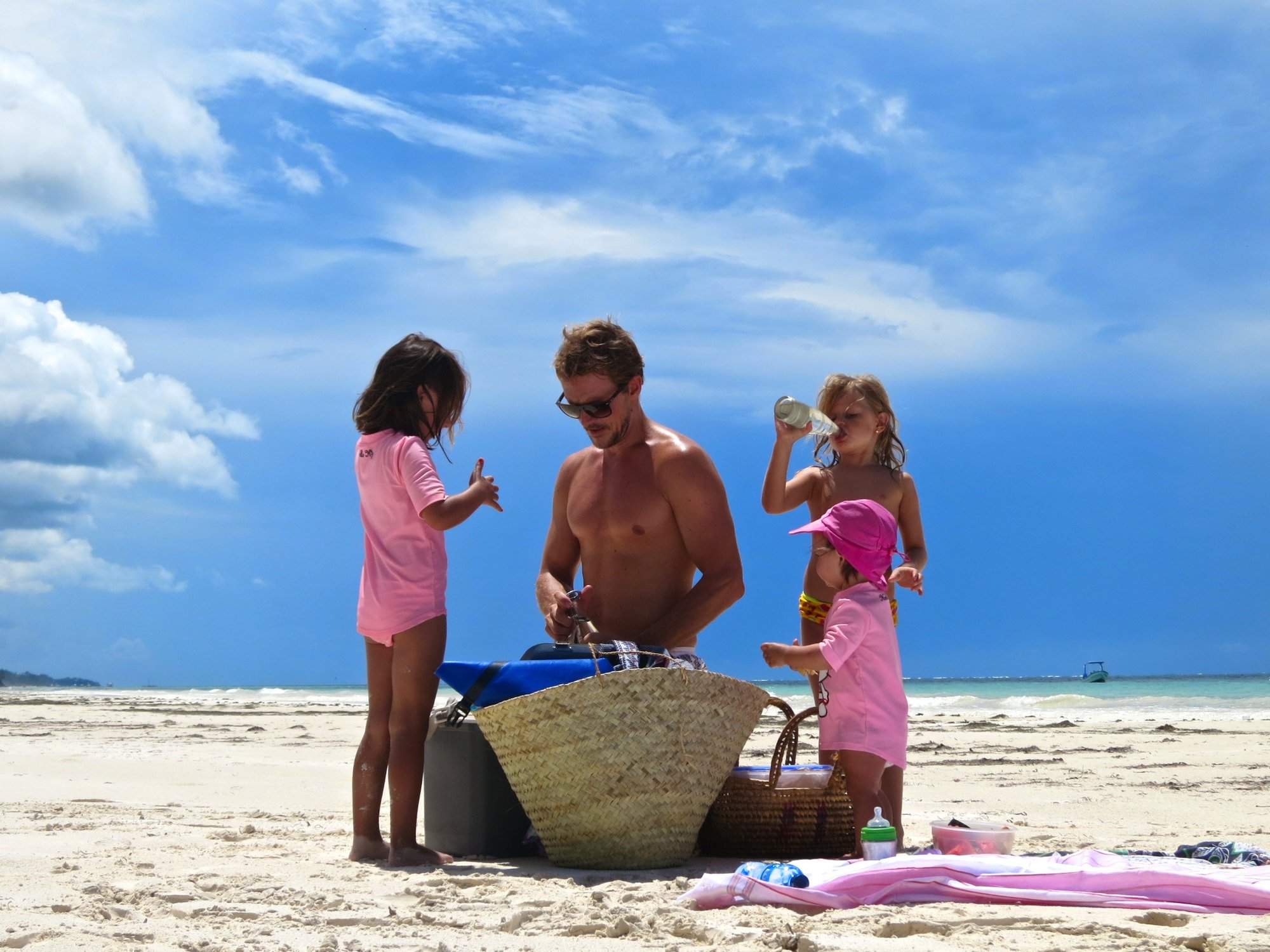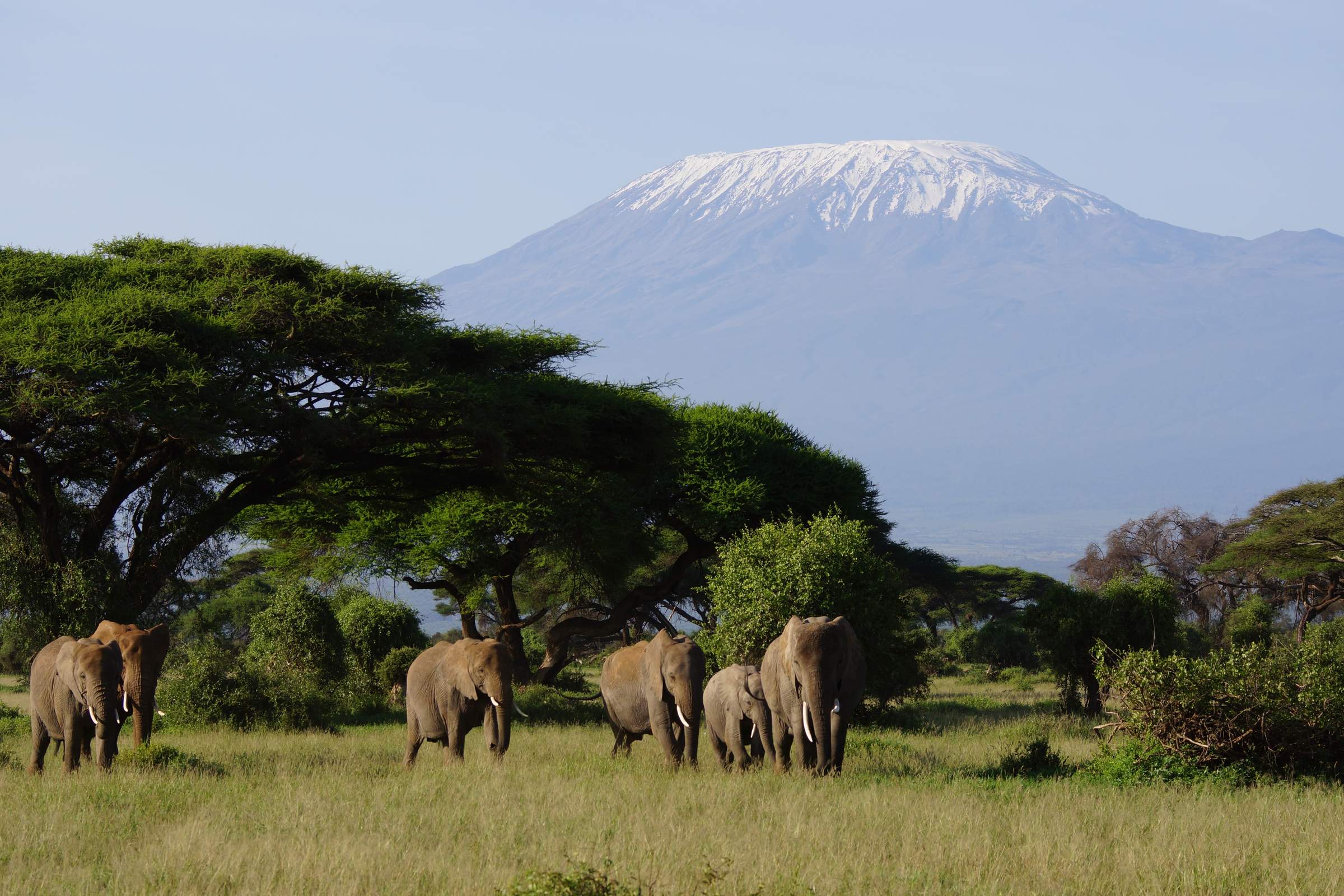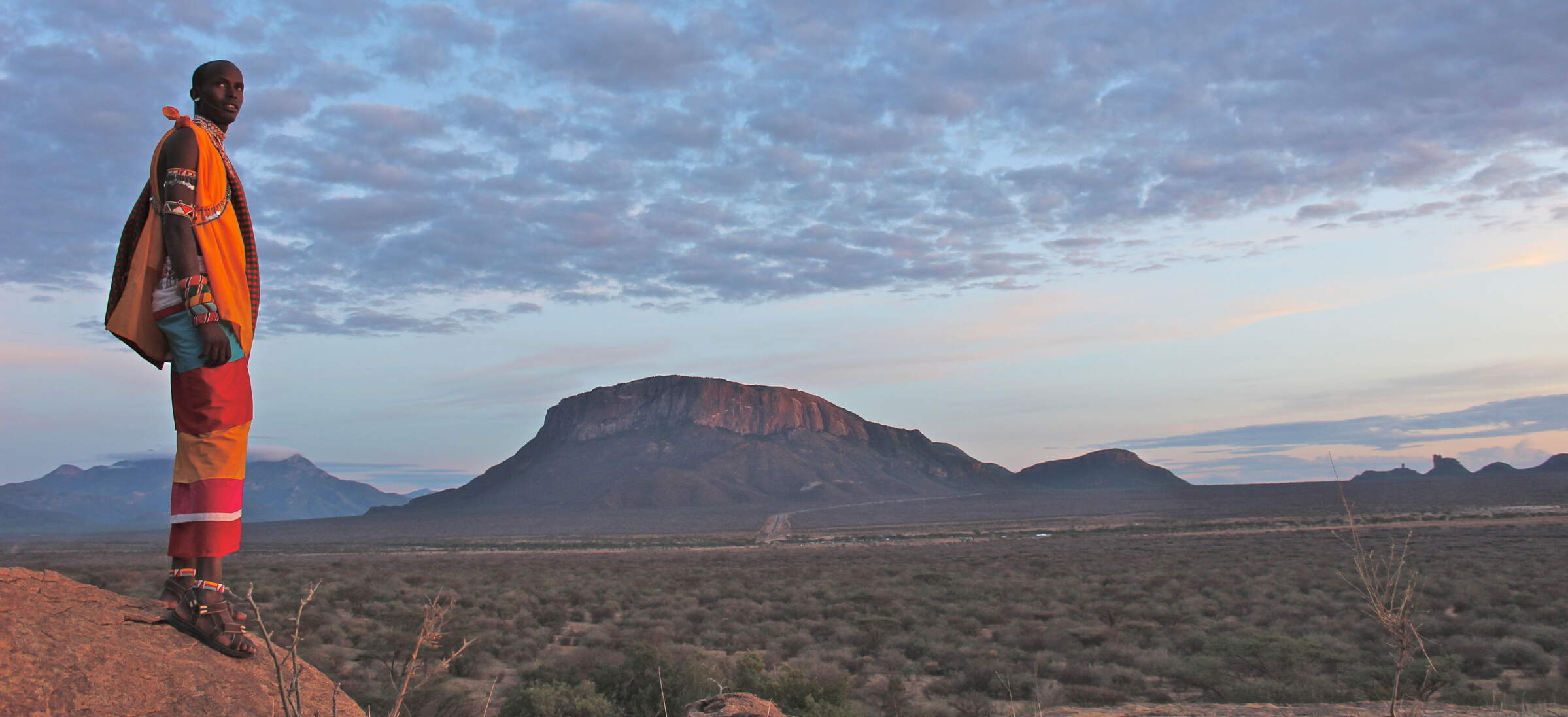Rekero: Our full report
A traditionally styled tented camp, Rekero is sited on the north bank of the Talek River, in a prime location ...
... in the centre of the Maasai Mara National Reserve in Kenya. It is just 3km upstream from the confluence of the Talek with the Mara, an important "bottleneck" area favoured by predators. During the migration season (roughly July to October) the plains around the camp are thick with wildebeest.One of three properties in the Mara region now owned by Asilia, Rekero was first set up in 1999. Located on the southern boundary of the Musiara sector of the national reserve, it faces the Sekenani sector across the Talek River, with a ford allowing easy access between the two (except when the Talek is in flood). This gives guests outstanding access to the bush, plains and marshes of both sectors. On a previous stay, we were greeted by a lioness crossing the riverbed carrying a young lion cub.
Spaced well apart along the river, Rekero's nine tents stand in cleared bush in the shade of thick forest, facing south over the Talek to the wooded banks on the far side. Each of the tents is accessed by a private path leading from a main footpath.
The tents are a good size, though not enormous. Tall trees offer some shade and double fly sheets help to keep down daytime temperatures. There's plenty of ventilation from large screened windows and thick bush growing close to the tents allows the screen covers to be kept unrolled without affecting privacy. The décor is stylishly understated, using muted greens, fawns and browns.
The front part of each tent forms a good-sized, fully screened vestibule, furnished with a day bed, a pair of canvas director's chairs and a card table. With the front screens open, guests can look out across the river. The main bedroom contains a large, comfortable double bed (with the option of twin beds), a chair and writing table with mirror, and a large storage trunk. The spacious bathroom is furnished with a double washstand with artisanal toiletries, a clothes chest and hanger rail, and a curtained-off, wood-floored shower area.
Tents #1 and #2 are the family tents and slightly older in style than tents #3 to #9. They are the closest to the main areas and sleep five (or six at a pinch). At present these family tents consist of two bedrooms with one shared bathroom. On request, any of the tents can be converted to a triple, with a maximum of three triples in at any one time.
Rekero's main areas focus around its decking area, which combines the lounge and mess tent, with informal, natural tropical gardens all around. The small gift shop offers crafts and souvenirs made by staff and their families and items bought in from a Nairobi slum children's project.
Breakfast and lunch are usually served at large communal tables on the deck, where guests mingle to share experiences or do some birdwatching. The evening fire, surrounded by director's chairs, is either lit on the lawn or down on the 'beach' next to the Talek River.
The lounge tent is a good size and well furnished with comfy sofas and armchairs. The mess tent is fairly spartan by day, featuring a long, communal dining table and folding chairs. In the evening, the decorated table is very inviting by candlelight.
To the side of the main deck, is a smaller second deck and lounge area, with stylish sofas and chairs and a good-sized alternative dining table. The deck stretches out over the river to make a really good sundowner or observation spot. It is also ideal for travellers who prefer to dine alone, for young families or a small group travelling together.
Rekero's focus is wildlife-watching, and most activities come under that heading, with morning and late-afternoon wildlife drives the main excursions on offer. Due to its central location in the Mara eco-system and its excellent guiding staff, Rekero has a well-established reputation for delivering outstanding wildlife-viewing.
Because the camp is within the Maasai Mara National Reserve, walks and night drives cannot be offered from Rekero, although both can be done at Rekero's sister camps Naboisho Camp and Encounter Mara Camp in the nearby Mara Naboisho Conservancy. All-day game drives from Rekero can be offered in here (with additional fees payable). Some travellers who have four nights or more in the Mara region choose to split their time between Rekero and Naboisho or Encounter Mara.
Other activities include free nature walks around the camp, village and school visits (US$30 per person) and, for children, bow-and-arrow making and practice.
Our view
Rekero has one of the most central locations in the Mara but this also makes the surrounding area an attractive target for wildlife-viewing vehicles from other camps, and the area can be very busy in the migration season. Nevertheless, Rekero is a friendly and comfortable camp and we found it easy to relax here. It's run by an enthusiastic and knowledgeable team and we were impressed by the service and attention from staff. The large number of repeat guests is indicative of Rekero's dedication to offering a first-class safari experience, with incredible guiding that justifies its relatively high rates.
Geographics
- Location
- Maasai Mara National Reserve, Kenya
- Ideal length of stay
- We recommend a minimum of three nights at Rekero, allowing time for two or three morning and two or three evening wildlife drives and enabling you to become familiar with the plains and riverine forest of the national reserve.
For a slightly different environment, you could combine several nights at Rekero with two or three nights at the co-owned Naboisho Camp, around 1.5 hours' drive away in the Naboisho Conservancy, where there are fewer visitors. - Directions
- The flight from Nairobi to Ol Kiombo airstrip takes about an hour, then it's a 30-minute drive through the reserve to Rekero. After rain, if this route is impassable, you can fly to Musiara airstrip, a 45-minute drive from Rekero. Flights from Nairobi to Musiara also take about an hour.
- Accessible by
- Fly-and-Transfer
Food & drink
- Usual board basis
- Full Board & Activities
- Food quality
- Rekero's food is well prepared and creative. Early morning tea or coffee is brought to your tent at a prearranged time, depending on when you want to start your first wildlife drive.
Breakfast is often a picnic by the Mara River during an extended drive, and includes the full range of cereals, fruit and yoghurt, with freshly baked bread, muffins, bacon and egg quiche and cold sausages. Alternatively, breakfast in camp is normally served on the deck, with a full English-style cooked breakfast available as well as a buffet.
On our most recent visit to Rekero we enjoyed a lunch of chicken curry, rice, chapattis and a range of salads. This was followed by a sticky almond square.
Afternoon tea, coffee and cake are available at 4.00pm and pre-dinner drinks and nibbles are served around the fire.
The three-course set dinner is normally served in the mess tent, as a convivial group meal hosted by the managers, who also help to serve. During our visit we had a feta cheese and watermelon salad, this was followed by a roast butternut squash tagliatelle. Desert was a delicious mango cheesecake. Private dining arrangements can easily be made if you prefer and the menu can be altered to suit your dietary requirements. - Dining style
- Group Meals
- Dining locations
- Indoor and Outdoor Dining
- Further dining info, including room service
- Yes, frequently arranged
- Drinks included
- All drinks are included apart from premium wines and champagne. Each tent is supplied with drinking water.
Special interests
- Birdwatching
- Kenya birdwatching is good here for the variety of habitats in the vicinity. Birders will enjoy the privacy of the tent veranda areas with uninterrupted views across the rocky valley of the Talek River.
- See ideas for Birdwatching in Kenya
- Photography holidays
- Near the confluence of the Mara and Talek rivers, Rekero is in the heart of the Mara reserve – ideally located to capture the migration. The standard of guiding is superb and a specialised photographic vehicle is also available to book.
- See ideas for Photography holidays in Kenya
- Wildlife safaris
- Rekero was the camp where Jackson Looseyia (of Big Cat Diary fame) first earned his spurs as a spotter and outstanding guide. More recently its first-class lion, leopard and cheetah viewing made it ideal as a base for much of the filming of Disney's African Cats documentary.
- See ideas for Wildlife safaris in Kenya
Children
- Attitude towards children
- Rekero feels relaxed and unpretentious and this can work well for older children.
- Property’s age restrictions
- Rekero welcomes children over the age of five.
- Special activities & services
- Special activities & services:
E.g. child-minding, kids clubs, meals, walks
There are nature walks for children around camp, and down to the riverside, as well as bow-and-arrow making and practice. Informal football or other games can be played on the lawns (with guests' own equipment).
Children's meals can easily be provided. Babysitting is not available in the daytime, although an askari (guard) can be posted near the tent at night to allow parents to have dinner without the children. - Equipment
- No specific children’s equipment is available, but all requirements can be organised.
- Generally recommended for children
- Although Rekero happily welcomes children above the age of five, we don't think of the camp as particularly child-friendly or ideal for families. Many guests are serious photographers and wildlife watchers, so family guests will need to keep younger members reasonably quiet most of the time. Guests often bring nannies and the majority of family guests are local residents.
- Notes
- Parents/carers will need to keep an eye on young children at all times because of the proximity of the river and wild bush close to camp.
Our travellers’ wildlife sightings from Rekero
Since mid-2018, many of our travellers who stayed at Rekero have kindly recorded their wildlife sightings and shared them with us. The results are below. Click an animal to see more, and here to see more on our methodology.

100% success

100% success

100% success

100% success

100% success

100% success

100% success

100% success

86% success

71% success

57% success

8% success

0% success

0% success

0% success

0% success
Communications
- Power supply notes
- Rekero is run almost entirely off solar power although there is a backup generator.
- Communications
- There is a separate WiFi tent behind Tent 4 that guests can use. There’s good cellphone network coverage, with a good Safaricom signal in camp too.
- TV & radio
- None
- Water supply
- Transported in
- Water supply notes
- Mineral water is brought in from Nairobi.
Health & safety
- Malarial protection recommended
- Yes
- Medical care
- All Rekero’s vehicles are equipped with first-aid supplies and all staff take a first-aid course every six months. A trained nurse is available at the neighbouring camp, Mara Intrepids.
The flying doctor service can always be contacted and would fly to Ol Kiombo or Musiara airstrip. In addition, Asilia are covered by the South African insurance group SATIB, whose doctors are trained to offer remote first-aid advice and instructions in case of emergency. - Dangerous animals
- High Risk
- Security measures
- Each tent has a horn to alert your askari in the event of an emergency, and two-way radios are also provided to communicate with the central area. Hippos come ashore at night and the area is full of wildlife. During the day, housekeeping staff will escort guests or help with luggage. At night, askaris armed with traditional weapons patrol the camp and are always on hand to escort guests. The head askari has been with Rekero since it was first opened in 1999.
- Fire safety
- The Talek River forms a natural fire break. All tents have fire extinguishers and all staff know how to use them. There is a formal fire assembly point and staff have regular fire drills.
Activities
4WD Safari
Birdwatching
Cultural excursion
Hot air ballooning
Private activities
Extras
- Disabled access
- On Request
- Laundry facilities
- Full Laundry Service is included in the cost. For cultural reasons ladies underwear is not accepted.
- Money
- Valuables can be locked in the main camp safe if required. There is no currency exchange and few guests need to pay for anything apart from staff tips or curios.
- Accepted payment on location
- Cash payments may be made in US dollars, euros, pounds sterling or Kenyan shillings. Visa and MasterCard are accepted with a 4% surcharge, but Amex is not accepted.
Other lodges in Maasai Mara National Reserve
Alternative places to stay in this same area.







